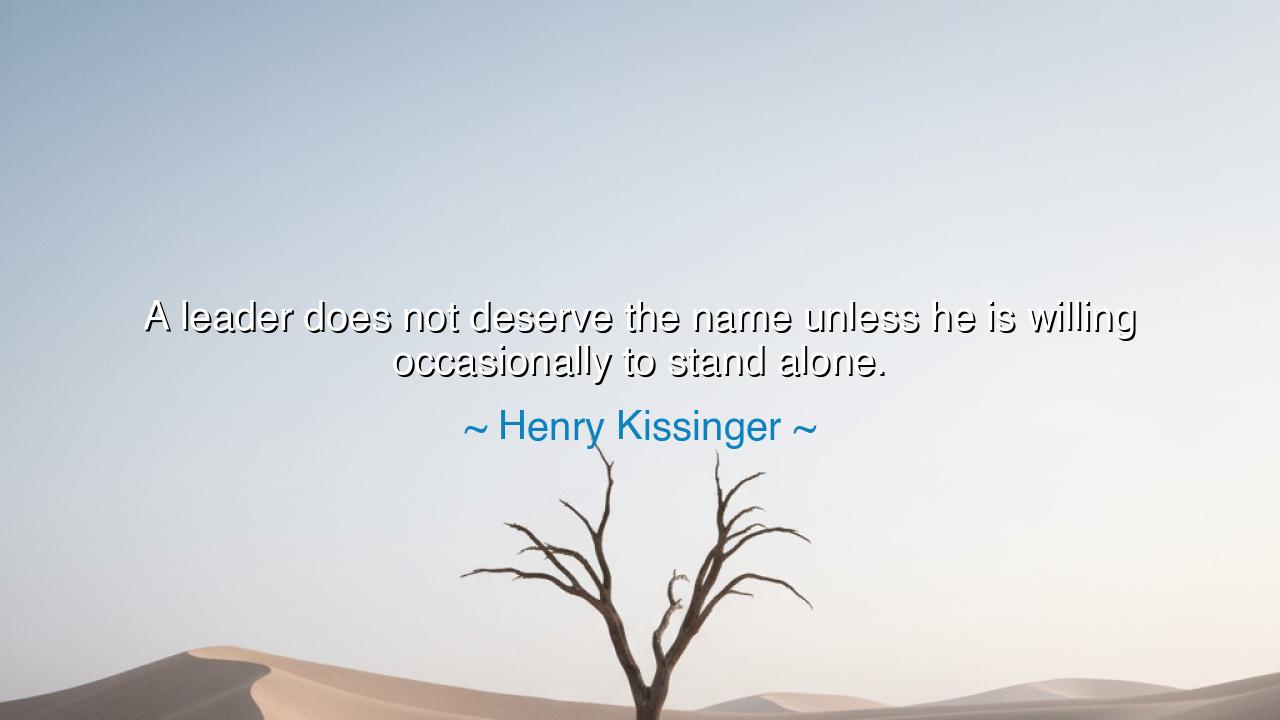
A leader does not deserve the name unless he is willing






“A leader does not deserve the name unless he is willing occasionally to stand alone.” — thus spoke Henry Kissinger, the statesman and strategist whose life traversed the turbulent seas of twentieth-century power. In these words lies a truth as old as kingship itself — that true leadership demands courage in solitude, that the one who would guide others must sometimes walk where none will follow. Kissinger’s world was one of diplomacy and danger, of choices made beneath the shadow of history. Yet his insight is not confined to the councils of power — it speaks to the eternal burden of those who would lead with vision rather than convenience, conviction rather than applause.
To “stand alone” is to endure the cold silence of misunderstanding, to hold one’s ground when the world wavers. Many wear the mask of leadership — they speak loudly, seek approval, and move with the crowd. But leadership of this kind is mere performance. The true leader, Kissinger reminds us, must possess the moral solitude to choose what is right over what is easy, to act from principle even when abandoned by allies. For the essence of leadership is not command — it is conviction under trial. It is the still heart that does not tremble when the winds of opinion rage.
Consider the ancient figure of Socrates, that philosopher-warrior of truth. In the courtroom of Athens, accused and condemned by his own people, he stood utterly alone — calm, unyielding, devoted to the integrity of his conscience. He could have fled, or flattered, or feigned repentance, but he chose instead to drink the hemlock. Though he perished, his example outlived empires. Socrates showed that the strength of a leader is not measured by his following, but by his fidelity to the light within. So it is with every true leader: when the multitude departs, and the torches fade, it is solitude that reveals the worth of his soul.
Kissinger himself, though forged in modern times, spoke from that same lineage of endurance. As advisor and architect of America’s foreign policy during times of war and uncertainty, he faced storms of criticism and moments of isolation. Whether one agrees with his policies or not, his words reflect the weight of responsibility known to all who must decide amid competing truths. He understood that the leader’s path is not a road of comfort but of conscience — that to steer the ship of men, one must sometimes withstand the cries of the crew. The captain who fears the loneliness of command is unfit for the helm.
In every age, this truth has echoed in the lives of those who shaped destiny. Abraham Lincoln, in the darkest days of civil war, was despised by many in his own land. His faith in unity, his refusal to surrender the moral core of freedom, left him standing almost alone. Yet he endured — and in his solitude, he forged the rebirth of a nation. Winston Churchill, too, in the years before the Second World War, was a voice crying in the wilderness. When others sought peace with tyranny, he warned of the storm to come. They mocked him, shunned him, called him mad — yet when the storm broke, it was his steadfast isolation that became the foundation of victory.
To stand alone is therefore both burden and blessing. It is the test that separates the genuine from the pretender, the strong from the compliant. The crowd applauds success but rarely foresight; it follows once the battle is won, but rarely before the first step is taken. The leader must therefore possess not only vision but endurance — the courage to be misunderstood, the patience to wait for time’s vindication. For solitude is not emptiness to the wise — it is the crucible in which integrity is purified.
Lesson: If you would lead — whether a nation, a family, or even your own heart — you must learn to stand firm when all others yield. Seek not the comfort of agreement, but the clarity of truth. Do not fear solitude, for it is there that wisdom gathers and strength is born. When the moment comes to choose between popularity and principle, remember that history honors not those who followed the crowd, but those who stood alone for what was right.
Thus Kissinger’s words ring with both warning and inspiration. Leadership is not a crown to be worn, but a cross to be borne. It is the solitude of visionaries, prophets, and pioneers. The one who dares to lead must be ready to face silence, doubt, and even exile — for in that silence lies the proof of greatness. Better to stand alone in truth than to march with a multitude in error. For from such lonely courage, the ages carve their heroes.






AAdministratorAdministrator
Welcome, honored guests. Please leave a comment, we will respond soon